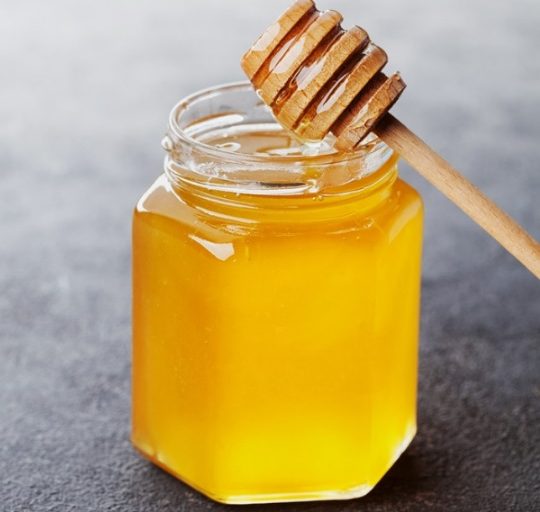Honey has been used by countless cultures all around the world over the past 2,500 years. While the numerous health benefits of honey have made it an important element of traditional medicines such as Ayurvedic treatments, scientists are also researching the benefits of honey in relation to modern medicine, particularly in the healing of wounds.
There is almost no part in the world where honey is not widely used and celebrated as a part of the cultural diet.
But what makes honey so popular? Most likely, it is the ease with which it can be consumed. One can eat honey directly, put it on bread like a jam, mix it with juice or any drink instead of sugar, or mix it with warm water, lime juice, cinnamon and other herbs to make a medicine. It is savored by all due to its taste as well as health benefits, making it extremely useful and versatile.
Honey properties:
The health benefits of honey include the following treatments, taken from both traditional and modern medical experts:
- Sweetener: Sugar can be substituted with honey in many food and drinks. Honey contains about 69% glucose and fructose, enabling it to be used as a sweetener that is better for your overall health than normal white sugar.
- Weight Loss: Though honey has more calories than sugar, when honey is consumed with warm water, it helps in digesting the fat stored in your body. Similarly, honey and lemon juice as well as honey and cinnamon help in reducing weight.
- Energy Source: Honey contains about 64 calories per tablespoon. Therefore, honey is used by many people as a source of energy. On the other hand, one tablespoon of sugar will give you about 15 calories. Furthermore, the carbohydrates in honey can be easily converted into glucose by even the most sensitive stomachs, since it is very easy for the body to digest this pure, natural substance.
- Improving Athletic Performance: Recent research has shown that honey is an excellent ergogenic aid and helps in boosting the performance of athletes. Honey is a great way to maintain blood sugar levels, muscle recuperation and glycogen restoration after a workout, as well as regulating the amount of insulin in the body, as well as energy expenditure.
- Source of Vitamins and Minerals: Honey contains a variety of vitamins and minerals. The type of vitamins and minerals and their quantity depends on the type of flowers used for apiculture. Commonly, honey contains Vitamin C, Calcium and Iron. If you check the vitamin and mineral content in regular sugar from any other source, you will find it to be completely absent or insignificant.
- Antibacterial and Antifungal Properties: Honey has anti-bacterial and anti-fungal properties, so it is often used as a natural antiseptic in traditional medicines.
- Antioxidants: Honey contains nutraceuticals, which are very effective for the removal of free radicals from the body. As a result, our body immunity is improved against many conditions, even potentially fatal ones like cancer or heart disease.
- Skin Care with Milk and Honey: Milk and honey are often served together, since both of these ingredients help in creating smooth, beautiful skin. Consuming milk and honey every morning is a common practice in many countries for this very reason.
- Honey in Wound Management: Significant research is being carried out to study the benefits of honey in the treatment of wounds. The Nursing Standard explains some of these benefits of honey in wound management in the document. These have been listed below: honey possesses antimicrobial properties, it helps in promoting autolytic debridement, it deodorizes malodorous wounds, it speeds up the healing process by stimulating wound tissues, it helps in initiating the healing process in dormant wounds and honey also helps in promoting moist wound healing.
The healing powers of honey are not overstated.
How is Manuka Honey different?
Honey has been used for many years by people all over the world; references to honey can be traced back centuries, and in fact, honey is often referred to as an ancient luxury food! Over the years people have also realized that honey has far more properties and can also be used in the medicinal world. This realization of the therapeutic aspects of honey has been recently rediscovered by the modern world and is now seen as one of the modern miracles of science as we return to nature in our fight against super bugs.
Manuka Honey is one such branch of the honey family whose properties have recently been rediscovered. This indigenous plant of New Zealand only grows in certain uncultivated areas which makes it quite rare. This rarity is possibly why its properties have not been recognized before.
Throughout history, honey has been used for wound dressing, and recent hospital trials have shown it to be effective in our modern times as well. These same trials that investigate the usefulness of honey and its application in the modern medical world have revealed some interesting insights into how we can use honey and benefit from it. The trials discovered that manuka honey has numerous unique antibiotic properties. Due to these trials, manuka honey is now being considered for digestive uses and treating skin surface-related ailments.
In order to understand the importance of manuka honey in the medical world, it is necessary to know about honey in greater detail. Honey contains chemical hydrogen peroxide, which is antibacterial in nature. This is produced by enzymes within the honey itself. Any exposure to heat, light and bodily fluids can destroy the enzymes, and honey will then lose its antibacterial properties. Certain rare honeys like manuka honey are thought to have antibacterial properties, which means that manuka honey has more stable and persistent antibacterial properties.
Breakfast tip to start your day:
A bowl of oatmeal with oat milk sweetened with honey, add raisins or blueberries, starting your day with all the carbohydrates, proteins and minerals in a single dish. Taking care of yourself naturally is a pleasure.




